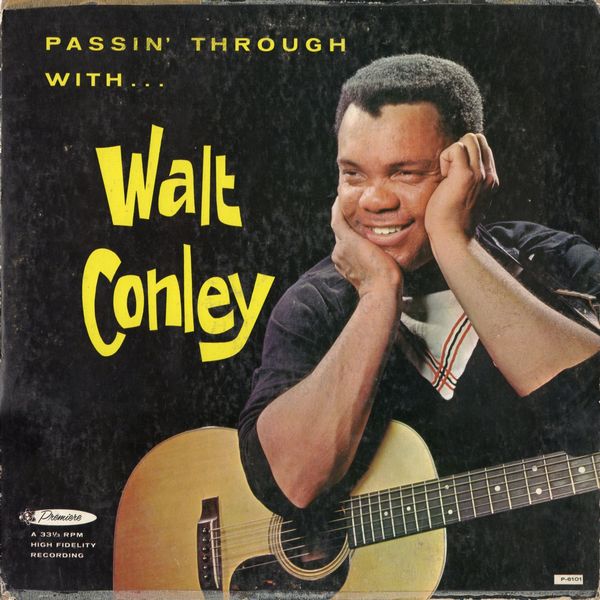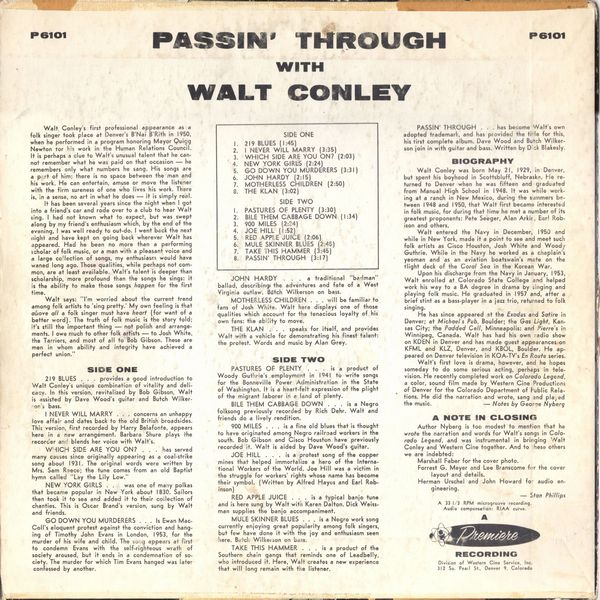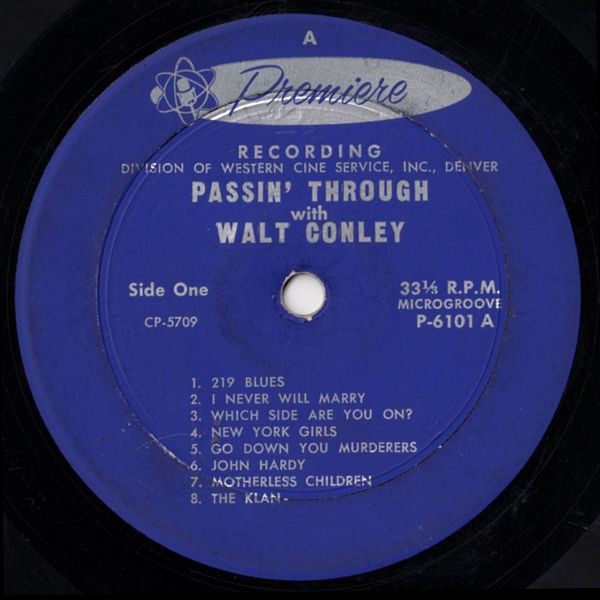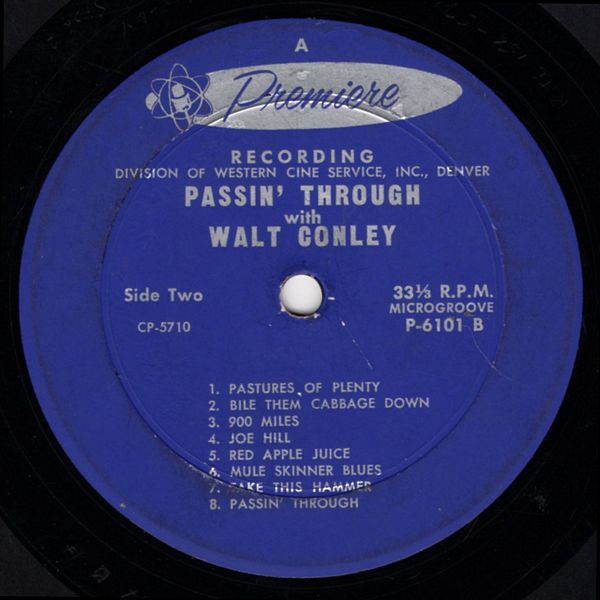
 |


 |
Sleeve Notes
Walt Conley's first professional appearance as a folk singer took place at Denver s B'Nai B'Rith in 1950, when he performed in a program honoring Mayor Quigg Newton tor his work in the Human Relations Council. It is perhaps a clue to Walt's unusual talent that he cannot remember what he was paid on that occasion — he remembers only what numbers he sang. His songs are a part of him; there is no space between the man and his work. He can entertain, amuse or move the listener with the firm sureness of one who lives his work. There is, In a sense, no art in what he does — it is simply real.
It has been several years since the night when I got into a friend's car and rode over to a club to hear Walt sing. I had not known what to expect, but was swept along by my friend's enthusiasm which, by the end of the evening, I was well ready to out-do. I went back the next night and have kept on going back wherever Walt has appeared. Had he been no more than a performing scholar of folk music, or a man with a pleasant voice and a large collection of songs, my enthusiasm would have waned long ago. Those qualities, while perhaps not common, are at least available. Walt's talent is deeper than scholarship, more profound than the songs he sings: it is the ability to make those songs happen for the first time.
Walt says: "I'm worried about the current trend among folk artists to 'sing pretty.' My own feeling is that above all a folk singer must have heart (for want of a better word). The truth of folk music is the story told; it's still the important thing — not polish and arrangements. I owe much to other folk artists — to Josh White, The Tarriers, and most of all to Bob Gibson. These are men in whom ability and integrity have achieved a perfect union."
219 Blues — provides a good introduction to Walt Conley's unique combination of vitality and delicacy. In this version, revitalized by Bob Gibson, Walt is assisted by Dave Wood's guitar and Butch Wilkerson's bass.
I Never Will Marry — concerns an unhappy love affair and dates back to the old British broadsides. This version, first recorded by Harry Belafonte, appears here in a new arrangement. Barbara Shure plays the recorder and blends her voice with Walt's.
Which Side Are You On? — has served many causes since originally appearing as a coal-strike song about 1931. The original words were written by Mrs. Sam Reece; the tune comes from an old Baptist hymn called "Lay the Lily Low."
New York Girls — was one of many polkas that became popular in New York about 1830. Sailors then took it to sea and added it to their collection of chanties. This is Oscar Brand's version, sung by Walt and friends.
Go Down You Murderers — Is Ewan MacCoLl's eloquent protest against the conviction and hanging of Timothy John Evans in London, 1953, for the murder of his wife and child. The song appears at first to condemn Evans with the self-righteous wrath of society aroused, but it ends in a condemnation of society. The murder for which Tim Evans hanged was later confessed by another.
John Hardy — a traditional "barman" ballad, describing the adventures and fate of a West Virginia outlaw. Butch Wilkerson on bass.
Motherless Children — will be familiar to fans of Josh White. Walt here displays one of those qualities which account for the tenacious loyalty of his own fans: the ability to move.
The Klan — speaks for itself, and provides Walt with a vehicle for demonstrating his finest talent: the protest. Words and music by Alan Grey.
Pastures Of Plenty — is a product of Woody Guthrie's employment in 1941 to write songs for the Bonneville Power Administration in the State of Washington. It is a heart-felt expression of the plight of the migrant laborer in a land of plenty.
Bile Them Cabbage Down — is a Negro folksong previously recorded by Rich Dehr. Walt and friends do a lively rendition.
900 Miles — is a fine old blues that is thought to have originated among Negro railroad workers in the south. Bob Gibson and Cisco Houston have previously recorded it. Walt is aided by Dave Wood's guitar.
Joe Hill — is a protest song of the copper mines that helped immortalize a hero of the International Workers of the World. Joe Hill was a victim in the struggle for workers' rights whose name has become their symbol. (Written by Alfred Hayes and Earl Robinson)
Red Apple Juice — is a typical banjo tune and is here sung by Walt with Karen Dalton. Dick Weissman supplies the banjo accompaniment.
Mule Skinner Blues — is a Negro work song currently enjoying great popularity among folk singers, but few have done it with the joy and enthusiasm seen here. Butch Wilkerson on bass.
Take This Hammer — is a product of the Southern chain gangs that reminds one of Leadbelly, who introduced it. Here, Walt creates a new experience that will long remain with the listener.
Passin' Through — has become Walt's own adopted trademark, and has provided the title for this, his first complete album. Dave Wood and Butch Wilkerson join in with guitar and bass. Written by Dick Blakesly.
Biography
Walt Conley was born May 21, 1929, in Denver, but spent his boyhood in Scottsbluff, Nebraska. He returned to Denver when he was fifteen and graduated from Manual High School in 1948. It was while working at a ranch in New Mexico, during the summers between 1948 and 1950, that Walt first became interested in folk music, for during that time he met a number of its greatest proponents: Pete Seeger, Alan Arkin, Earl Robison and others.
Walt entered the Navy in December, 1950 and while in New York, made it a point to see and meet such folk artists as Cisco Houston, Josh White and Woody Guthrie. While in the Navy he worked as a chaplain's yeoman and as an aviation boatswain's mate on the flight deck of the Coral Sea in the Korean War.
Upon his discharge from the Navy in January, 1953, Walt enrolled at Colorado State College and helped work his way to a BA degree in drama by singing and playing folk music. He graduated in 1957 and, after a brief stint as a bass-player in a jazz trio, returned to folk singing.
He has since appeared at the Exodus and Satire in Denver; at Michael s Pub, Boulder; the Gas Light, Kansas City; the Padded Cell, Minneapolis: and Pierre's in Winnipeg, Canada. Walt has had his own radio show on KDEN in Denver and has made guest appearances on KFML and KLZ, Denver, and KBOL, Boulder. He appeared on Denver television in KOA-TV's En Route series.
Walt's first love is drama, however, and he hopes someday to do some serious acting, perhaps in television. He recently completed work on Colorado Legend, a color, sound film made by Western Cine Productions of Denver for the Colorado Department of Public Relations. He did the narration and wrote, sang and played the music.
Notes by George Nyberg
A Note In Closing
Author Nyberg is too modest to mention that he wrote the narration and words for Walt's songs in Colorado Legend, and was instrumental in bringing Walt Conley and Western Cine together.
Stan Phillips